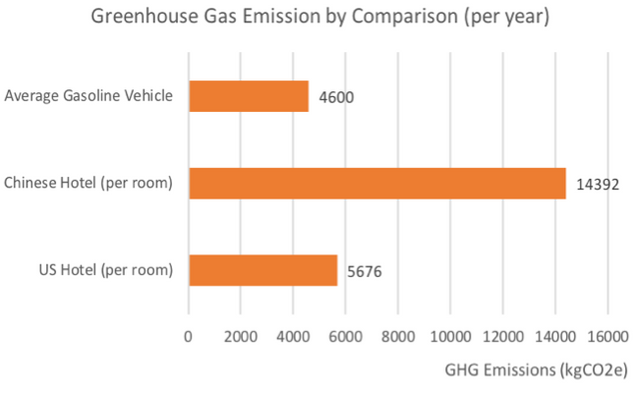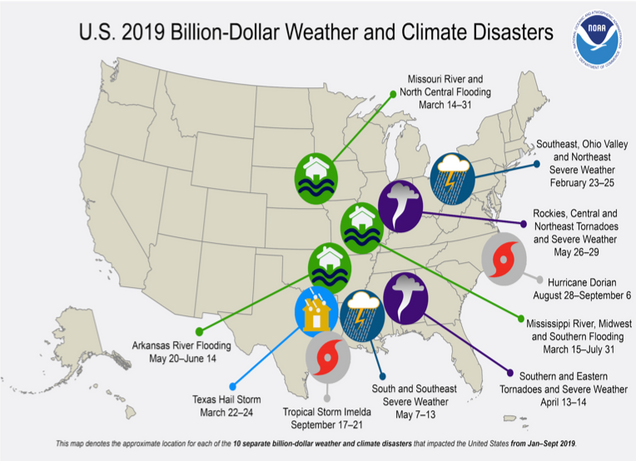On Climate Crisis: Are We Doing Too Little, Too Late?
By Shanshan He, Isabella Very
Why should we care about climate change?
Climate change related disasters are regularly making headlines: wildfires, floods, hurricanes, severe droughts, heatwaves as well as coastal erosion have caused countless instances of infrastructure damage, job loss, and even fatal emergencies in hotels, restaurants and vineyards. Some of the most urgent impacts, such as sea level rising, increased frequency of extreme storms and heavy precipitation suggest a continuing threat to the largest component of the global tourism industry: coastal tourism [1]. According to a recent report from STR, 31.3% of hotels in the United States are located in low-lying coastal areas which would be impacted by a sooner than expected sea level rise of up to six feet [2]. These low-lying coastal areas, according to the United Nations’ Intergovernmental Panel on Climate Change (IPCC), will experience detrimental impacts including submergence, coastal flooding, and coastal erosion due to the rise in sea level [3].
Many tourist destinations in the world have already become extremely vulnerable to the effects of climate change. In November 2019, Venice hit the highest water levels since 1966, resulting in devastation of tourist sites and local businesses. With a 3.3 feet sea level rise, an estimated 49 percent of resorts in the Caribbean will face adverse destruction or damages [4].
Moreover climate change also will take a heavy toll on winter tourism. A study, which analyzes climate change’s impact on alpine ski resorts, has projected winter overnight stays to decline by over 2 million overnight stays in Austria and Italy at 1.5°C warming, and with 2°C warming, 1.9 million overnight stays will be lost in addition [5]. While the Paris Climate Agreement and IPCC set 2°C warming as the limit to avoid catastrophic effects of climate change, the latest projection based on current policy suggests a 3.0 – 3.4°C warming by 2100 (See Figure 1).
Figure 1. 2100 Warming Projections
Source: Climate Action Tracker (2019)
Negative impacts are already underway. Even in an average 2°C rising temperature climate, 99% of coral reefs will be bleached, crop yields and marine fisheries will experience a substantial decline, and the global population will suffer from month-length heatwaves [6]. With the dire consequences that will affect the hospitality industry, there is a need to take action on reducing its greenhouse gas emissions as well as implementing risk management strategies.
Industry’s Carbon Footprint vs. Overtourism
Figure 2. Annual Global Tourism GHG Emissions
Source: Lenzen et al (2018)
Figure 3. Annual Emissions from Global Travel, by Country
Source: Atlas, Lenzen et al (2018)
According to the latest analysis, global tourism’s contributions to greenhouse gas emissions (GHG) is 4.4 billion metric tons each year, about 8% of total global emissions [7], which includes transportation, accommodation, food and beverages, etc (See Figure 2). Notably, the United States, China, Germany and India contribute the highest carbon emissions towards the tourism industry (See Figure 3). Both domestic and international tourism in China and India have drastically increased due to the rapid expansion of the middle-class. The desire to travel and consume is driven by higher income levels. As developing countries aspire to reach the living standards of developed countries, fundamental change in actions on reducing GHG emissions has to happen in developed countries like the United States.
Despite the fact that policymakers in the United States have not been supportive of the Paris Climate Agreement, the International Tourism Partnership (ITP) has set a target of reducing hospitality industry’s greenhouse gas (GHG) emissions by 66% per room per year from 2010 levels by 2030, and by 90% by 2050 [8], to align actions with limiting warming within the 2°C threshold. ITP emphasizes the need to utilize more carbon-efficient furniture, fixtures and equipment (FF&E) and more use of renewable energy within hotel properties.
While ITP’s goal seems hopeful, The Hotel Sustainability Benchmarking Index 2019 shows that a hotel room in the United States has a GHG emissions of 5,676 kg carbon dioxide equivalent (kgCO2e) per year on average while a hotel room in China emits 14,392 kgCO2e per year on average. The index includes emissions from electricity, HVAC, water and fuel combustion, but excludes emissions from other facilities such as restaurants and swimming pools [9]. In comparison, an average gasoline vehicle creates 4,600 kgCO2e per year, which is surprisingly less than the carbon footprint of a hotel room [10] (See Figure 4). As car companies are actively searching for renewable energy solutions to reach zero-emissions, renewable energy within hotels is yet to become the standard.
Figure 4. Hotel Room vs. Gasoline Vehicle Average GHG Emissions by Comparison
Source: Hotel Sustainability Benchmarking Index 2019, Environmental Protection Agency
Meanwhile, the global hotel-construction pipeline has reached 14,051 hotels (2.3 million rooms) at the end of Q2 2019, and projects in the United States and China account for 40% and 21% of the total pipeline respectively [11]. Hotel development constitutes additional GHG emissions from construction and operation. On the other side, the global travel market is not slowing down: based on World Travel & Tourism Council (WTTC)’s forecast, the global tourism industry’s contribution to global GDP will increase from 10.4% to 11.5% from 2019 to 2029 [12]. Based on WTTC forecast on tourism industry growth, overtourism is inevitable. While climate change is pressuring major global destinations, cities like Paris and Venice are already well-known for their overtourism challenges. In the meantime, WTTC predicts visitor volume growth in more than 20 major cities for the next decade [13]. With an additional 2.5 billion population in urban areas by 2050, balancing between tourism growth and GHG emissions becomes vital. As key contributors of tourism growth, the hospitality industry is facing a rather complex challenge: how do hotels and restaurants reduce GHG emissions while supporting sustainable industry growth?
Where do we go from here?
1. Involving All Stakeholders in Creating Solutions
Climate change is already happening, and we expect more climate-related natural disasters annually. When a natural disaster affects an area, the general public first seeks hotels and restaurants as food and shelter providers. As these events increase in frequency, hospitality properties should be cognizant of their growing importance as gathering places as well as potential models for sustainable business practices. Contingency plans need to be in place and communicated across all levels of operations, in the case of climate disasters.
Figure 5. U.S. 2019 Billion-Dollar Weather and Climate Disasters
Source: National Oceanic and Atmospheric Administration (2019)
To reduce GHG emissions, one property that has taken advantage of their location and positioned themselves for a leadership position in terms of sustainable practices is the Brando, a luxury resort property. They are positioned on the Tetiaroa lagoon in French Polynesia, which enables them to integrate significant sustainability initiatives [14]. Although many of these initiatives are unique to their geography, the Brando provides a positive example of a profitable, luxury resort which has adopted conservation programs as an integral part of their business model. Not only have they committed to the stewardship of their location, but they are reducing energy use by 70% with their Sea Water Air Conditioning system, coconut oil electricity generator as well as solar panels, which have come close to eliminating their carbon footprint.
Urban hotel properties such as the Lenox Hotel in Boston have also made progress on implementing sustainability solutions in energy, waste, water, air, purchasing and awareness [15]. The hotel has managed to offset 100% energy used and air pollution on site through Renewable Choice Energy carbon offsets. To bring awareness among employees and guests, the hotel offers an eco-lending library, related books, and movies for use in the hotel room. A “green team” was established to educate employees and support initiatives.
Sustainability initiatives require all stakeholders to participate: owners, asset managers, developers, management companies, employees and guests. Most importantly, the support needs to come from the top level. Once owners, developers and management companies understand the urgency to integrate eliminating GHG emissions and disaster-resistance architectural and interior design as part of their strategic plan, the detailed practices will be easily enforced on the operational level.
Nevertheless, the main concern of implementing sustainable initiatives is whether these long-term investments compromise the bottom line thus return on investment (ROI). Crist Inman, founder and CEO of La Paz Group, a hospitality consulting company based in Costa Rica that delivers sustainability solutions, reflected that clients who have invested in sustainability initiatives in their properties recognized significant financial benefits years later [16]. A study has shown that there is a direct correlation between hotels that are LEED certified and the increase of revenue per available room (RevPAR) [17] (See Figure 6). LEED certification, the well-recognized green building certification program, provides rigorous standards on sustainable building design and operations [18]. Yet, LEED certification does not require ongoing sustainability operations [19], and hotels should avoid using LEED as a “greenwashing” tactic to their exaggerate sustainable solutions. Another common greenwashing practice in hotel is the towel reuse program, which is a cost-saving strategy that many hotels utilize. The consequence of greenwashing is the loss of consumer loyalty and trust [20]. The only way to avoid greenwashing is to adopt a comprehensive program that practices sustainability throughout the property [21]. Although sustainable initiatives can be costly, hotels can not only help reduce GHG emission, but also gain consumer endorsement as well as financial benefits in the long run.
Figure 6. Mean RevPAR Comparison Before and After Certification
Source: Walsman et al (2014)
2. Changing Guests’ Perceptions
Guests’ perceptions about sustainability influence their willingness to book at environmentally sustainable properties, which are largely informed by prior experience and knowledge. Among all factors, inconvenience has the highest negative impact on guests’ willingness to stay at such properties, introducing an interesting balancing act to which hospitality companies should be paying attention [22]. As stated earlier, companies may be reluctant to incur costs associated with education on sustainability which is accessible to both employees and guests. Taking this concept further, the return on investment suggested by this data would include higher rates of booking at economically sustainable properties and a willingness to spend more money for a sustainable experience.
By utilizing the marketing in which hospitality companies already invest on popular distribution channels, properties which practice sustainable tourism may capitalize on this unique characteristic as an opportunity to communicate to guests about the importance of their product. Third party distribution channels online travel agencies (OTAs) have changed the way that hospitality companies market to their audience. These distribution channels capture approximately 40% of the online booking market [23]. These tools are powerful in their consumer reach and therefore offer an existing infrastructure by which guest education may occur effectively.
In a study testing a two-message appeal and two-message source, it was observed that “the highest intention to purchase an eco-accommodation was found for a promotional message, which is sent by an expert, expresses a rational appeal and includes a descriptive social norm. Perceived emotional value in contrast was increased with a blogger statement including an emotional appeal and an injunctive social norm [24].” Not only could this information be used to attract new consumers to purchase sustainable hospitality products, these strategies can also be applied to the education of current guests who may not yet be willing to spend extra money to prioritize sustainability. Many large companies, as mentioned above, are integrating sustainability reporting into their annual metrics. Marriott, for example, has released Sustainability And Social Impact reports for the last ten years and is working towards goals set for 2025, including reducing hotels’ water usage and carbon footprint and achieving sustainability certifications for 100% of their hotels [25].
The stagnation of climate negotiations internationally, as well as that of innovation in sustainable development for hospitality in the United States, could arguably be attributed to the culture of individualism and isolationism perpetuated by late-stage capitalism. In contrast, the idea of social capital puts emphasis on group potential and the pattern of relationships between individuals within groups and between groups, with a focus on social networks, norms, values, and mutual trust [26]. Social capital prioritizes group interest over individual interest, which is an idea often at odds with traditional western tenets of individualism.
Other cultures that do not subscribe to this philosophy utilize collective problem solving to promote rapid change. Native cultures that have worked tirelessly to preserve the biodiversity of land in their territories could thus attribute their ability to continuously adapt to changing landscapes, both literally and figuratively, to their development of a complex social network. Additionally, there is a visible increase in this sort of conservation activity when the decision-makers are directly affected by the land.
The United Nations’ Environmental Program’s Tourism Program “promotes sustainable tourism among government agencies and the industry; develops tools for protected/sensitive area management; and supports the implementation of multilateral environmental agreements related to tourism”[27]. This group sponsored The Quebec Declaration in 2002, which states that the community, as part of the social component, comprises the human capital which plays the role and maintains the responsibility of determining ecotourism development. In this way, in order to make positive impacts on sustainable hospitality, it is important to balance economic, social, and cultural factors, which could aid in making rapid change based on collective action [28].
The variables involved in collective action make this a difficult feat to accomplish. However, these sorts of complex social networks were found to be the most dominant variable which affects tourism development at sustainable properties [29]. Proactivity in sharing experience positively impacts participation in the network and enables stronger links to form between stakeholders. By increasing community, associate, and guest interest in sustainable hospitality, these complex networks can be utilized to positively impact sustainable development at popular destinations through collective action and rapid change [30].
3. Education as a Primary Tool to Combat Climate Change
One of the primary reasons for lack of action in response to climate change is a correlating lack of knowledge about the causes, effects, and initiatives in relation to the problem. In order to best combat climate change as hospitality professionals, students should be equipped with an academic understanding of the problem as a whole as well as the critical thinking skills to adapt to the ever-changing global situation. Education does not, however, stop at the academic level, but remains a vital tool to encouraging guests to consume sustainably.
Currently, no hospitality school domestically offers any courses delving into the complexities surrounding climate change, despite its enormous impact on the industry as a whole [31]. Due to its overwhelming presence in the lives of current students, in global politics, as well as professional and industry change as a whole, hospitality schools all over the country would be remiss to neglect consideration of an integrated curriculum along these lines. Sustainability practices should be taught in financial operations, employee experiences, community action, facilities management, purchasing, food production and preparation, event planning, real estate development as well as overall business plan [32].
While experience is important to the change that should take place within the hospitality industry to combat climate change, young professionals bring a fresh perspective as well as a unique interest in the problem. The Millennial generation and Generation X have grown up with the looming problem of climate change, which increases their personal stake in solving the problem as well as their political investment in sustainability.
Additionally, Pulitzer is working to educate the general public in this way by providing a comprehensive climate curriculum available online [33]. While this is a viable public access option, industry-specific education should not be neglected in favor of more general public education due to the high impact level specific industries have on the environment. Corporate structures should also take responsibility for their contribution to the massive problem of climate change and reach out to their consumers and associates with detailed reporting about the problem and how they are working to reduce it as an institution.
Many organizations have begun instituting procedures including such activities as annual Sustainability Reports or Plans which detail steps being taken to work towards a more sustainable business practice. However, as mentioned above, while positive, these may be too little too late. By working to change guest perceptions about climate change and the importance of investing in sustainable businesses, hospitality companies may be able to engage in programs to reverse their contribution to climate change with more appropriate funding and public opinion.
Conclusion
As the United Nations and European Parliament have declared climate change as an emergency [34][35], the hospitality industry also needs to take stronger actions against this crisis. Hotel companies can make significant impacts by integrating influential sustainable programs that have already proven effective. These include marketing sustainability as a viable and preferable option to guests as well as providing comprehensive climate education to students, professionals and consumers in order to better inform them of the importance and widespread nature of the climate crisis.
While many hotel owners are seeking short-term investment returns, more serious questions need to be addressed; How can hotel companies utilize sustainable practices most effectively in order to equally consider environmental impact and economic profit? How can industry institutions more effectively standardize the expectations for sustainability across the board? These sorts of questions have yet to be explored in order to better evaluate the significant changes that can feasibly be made to reduce the hospitality industry’s negative environmental impact.








